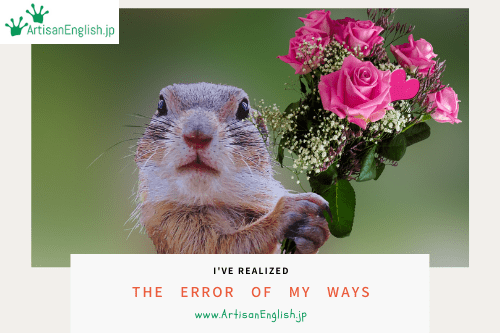
YouTube / iTunes / Spotify / Radio Public / Pocket Casts / Google Podcasts / Breaker / Overcast
Listen to ArtisanEnglish.jp posts & lesson intros here.
Phrase: The error of your ways
Take a moment to look back on your life until now.
Have you realized the error of your ways and modified your behaviour as you have progressed through the years, or have you continued to do the same things repeatedly?
Which is, by the way, the informal definition of an idiot.
As we grow older, we are also supposed to become wiser.
That’s the normal progression, anyways.
When someone recognizes the error of their ways, they become aware of their wrong actions or bad behaviour.
Sometimes, governments can notice the error of their ways and either reinstate a beneficial law they had previously removed or repeal one that doesn’t work as intended.
We have recently seen something along those lines occur on two occasions in Japan.
The first was when the Yokohama people voted against the incumbent mayor, who wanted to pursue the construction of a casino resort in favour of one who would cancel it.
In this case, the people themselves accepted the error of their ways in choosing the wrong mayor in the first place and doing something about it.
This week, the second incident occurred when the Wakayama prefecture legislature voted against pursuing a casino resort.
Yes, we can argue that they preempted having to learn from the error of their ways by not making the mistake of vying for one in the first place.
Casinos are not constructed for the people; they are built for the casino owner to make a killing.
I’d much rather prefer having an electric car factory than a casino resort any day.
Sure, casinos work in Las Vegas, but Vegas was built by the mafia.
At least we are learning through the error of their ways.
Flesch-Kincaid Readability Test
This post is understandable by someone with at least an 8th-grade education (age 13 – 14).
On the Flesch-Kincaid reading-ease test, this post scores 64.
The easier a passage is to read, the higher the score on a scale of 0 – 100.

